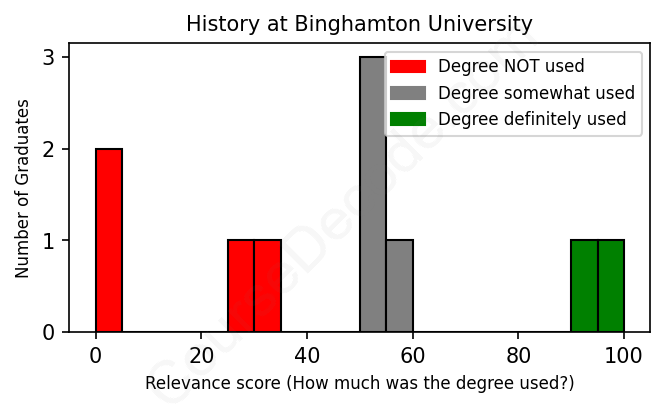
First, some facts. Of the History graduates from Binghamton University we've analyzed , here's how many have used (or NOT used) their degree in their career:

These are estimates based on AI analysis of 10 LinkedIn profiles (see below).
The verdict? Bad. Overall, with an average relevance score of 46%, History graduates from Binghamton University have a substantially lower likelihood (-21%) of finding work in this field compared to the average graduate across all fields:
And for comparison, here's the chart for all profiles we've looked at across all degrees.
Also, after graduating, 70% of these graduates have pursued further education other than another Bachelor's degree (such as a Masters degree or other), compared to the average across all profiles of 35%. This suggests you may need more than just a Bachelors degree to be competitive as a History graduate.
See the details:
|
Relevance score: 57% We think this person has gone into a career only somewhat relevant to their degree. We think this person has gone into a career only somewhat relevant to their degree.
DEGREE INFOGraduated in 2018 from Binghamton University with a Bachelor of Arts - BA in History. Also pursued further education since (see below). JOB HISTORY SINCE GRADUATIONCoach Orange County Rowing Assosciation Apr 2019 - Jun 2020 Teaching Fellow  Citizen Schools Jun 2020 - Jul 2022 Social Studies Teacher  Somerville Public Schools Aug 2022 - Present FURTHER DEGREES DONE SINCE GRADUATINGMaster of Education - MEdUniversity of Massachusetts Boston 2021 - 2022 ABOUTGraduate from SUNY Binghamton with a bachelors in history. Masters of Education from UMass Boston TNY program. Accomplished Rower for Binghamton University Rowing, with experience in coaching and safety. Highly skilled in research analysis and research presentation. Looking to expand my education while also searching for job opportunities to expand my experience. |
The top 10 most common jobs done by the graduates we've analyzed (ranked most common to least) are:
Here is a visual representation of the most common words in job titles for History graduates (this is across all History graduates we've analyzed, not just those who went to Binghamton University):

Looking at the career trajectories of graduates from Binghamton University's History program, it seems like they start off with a wide range of jobs right after graduation, but many initially veer away from history-related fields. For instance, some graduates have taken roles in sales and financial services, while others have worked in various support roles like greeters or clerks. This suggests that the first jobs after graduation can often be more about finding something that pays the bills rather than diving into a history-focused role. However, alumni who did manage to snag entry-level positions in museums or research-related jobs show that there's potential for work in historical fields if that's the direction they aim for.
Fast forward five to ten years, and while some individuals have stayed in the history realm—like those who became curatorial assistants or worked in libraries—many others have ventured into seemingly unrelated areas like finance or legal work. Others have followed paths into government positions or public service. This diversity of career paths reflects the versatility of a History degree, even if it doesn’t always lead directly into historical professions. It may take some time for graduates to settle into roles that truly align with their passion for history, and many might find themselves successfully carving out fulfilling careers in completely different fields. Overall, while some graduates may feel like their current jobs don't fully resonate with their degrees, many have still found solid career opportunities in the long run.
Getting a Bachelor's degree in History at Binghamton University is definitely challenging, but it’s not the hardest thing out there either. You’ll dive into a lot of reading, writing, and critical thinking, which means you’ll spend some serious time analyzing texts and crafting essays. While it can be a ton of work, especially when you’re juggling multiple courses and deadlines, if you enjoy history and have a passion for learning about different cultures and events, it can also be pretty rewarding. Overall, it’s about average in difficulty compared to other degrees, but if you're genuinely interested in the subject, you might find it more engaging than tough. Just be prepared to put in the effort!
Most commonly, in the LinkedIn profiles we've looked at, it takes people 4 years to finish a Bachelor degree in History.
Looking at these graduates from Binghamton University, it seems like their earnings vary quite a bit based on the jobs they secured after graduation. The ones who went into fields like finance, government, and law tend to have positions that could potentially pay decent salaries, like the Immigration Services Officer and the Assistant District Attorney; these roles usually come with solid compensation down the line. Others, especially those in education and non-profits, might struggle a bit more with salaries, as these sectors often don’t pay as well. Overall, it looks like some are doing fairly well money-wise, while a few might be on the lower end of the spectrum in terms of income.
Here is a visual representation of the most common words seen in the "about" section of LinkedIn profiles who have a Bachelor degree in History (this is across all History graduates we've analyzed, not just those who went to Binghamton University). This may or may not be useful:

Here are all colleges offering a Bachelor degree in History (ordered by the average relevance score of their History graduates, best to worst) where we have analyzed at least 10 of their graduates: